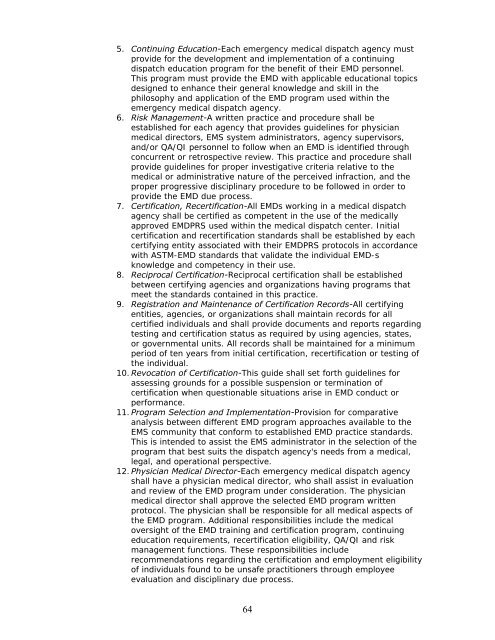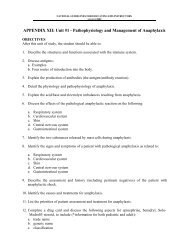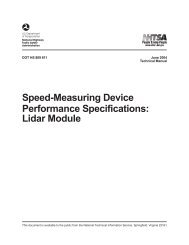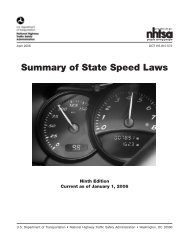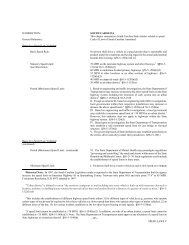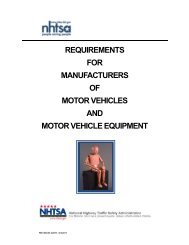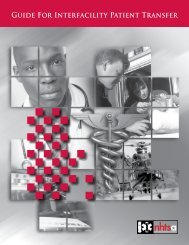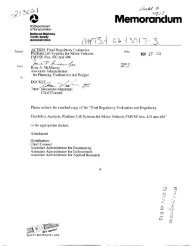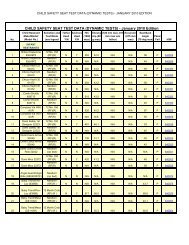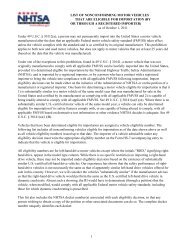Standard Practice for Emergency Medical Dispatch ... - NHTSA
Standard Practice for Emergency Medical Dispatch ... - NHTSA
Standard Practice for Emergency Medical Dispatch ... - NHTSA
Create successful ePaper yourself
Turn your PDF publications into a flip-book with our unique Google optimized e-Paper software.
5. Continuing Education-Each emergency medical dispatch agency must<br />
provide <strong>for</strong> the development and implementation of a continuing<br />
dispatch education program <strong>for</strong> the benefit of their EMD personnel.<br />
This program must provide the EMD with applicable educational topics<br />
designed to enhance their general knowledge and skill in the<br />
philosophy and application of the EMD program used within the<br />
emergency medical dispatch agency.<br />
6. Risk Management-A written practice and procedure shall be<br />
established <strong>for</strong> each agency that provides guidelines <strong>for</strong> physician<br />
medical directors, EMS system administrators, agency supervisors,<br />
and/or QA/QI personnel to follow when an EMD is identified through<br />
concurrent or retrospective review. This practice and procedure shall<br />
provide guidelines <strong>for</strong> proper investigative criteria relative to the<br />
medical or administrative nature of the perceived infraction, and the<br />
proper progressive disciplinary procedure to be followed in order to<br />
provide the EMD due process.<br />
7. Certification, Recertification-All EMDs working in a medical dispatch<br />
agency shall be certified as competent in the use of the medically<br />
approved EMDPRS used within the medical dispatch center. Initial<br />
certification and recertification standards shall be established by each<br />
certifying entity associated with their EMDPRS protocols in accordance<br />
with ASTM-EMD standards that validate the individual EMD-s<br />
knowledge and competency in their use.<br />
8. Reciprocal Certification-Reciprocal certification shall be established<br />
between certifying agencies and organizations having programs that<br />
meet the standards contained in this practice.<br />
9. Registration and Maintenance of Certification Records-All certifying<br />
entities, agencies, or organizations shall maintain records <strong>for</strong> all<br />
certified individuals and shall provide documents and reports regarding<br />
testing and certification status as required by using agencies, states,<br />
or governmental units. All records shall be maintained <strong>for</strong> a minimum<br />
period of ten years from initial certification, recertification or testing of<br />
the individual.<br />
10. Revocation of Certification-This guide shall set <strong>for</strong>th guidelines <strong>for</strong><br />
assessing grounds <strong>for</strong> a possible suspension or termination of<br />
certification when questionable situations arise in EMD conduct or<br />
per<strong>for</strong>mance.<br />
11. Program Selection and Implementation-Provision <strong>for</strong> comparative<br />
analysis between different EMD program approaches available to the<br />
EMS community that con<strong>for</strong>m to established EMD practice standards.<br />
This is intended to assist the EMS administrator in the selection of the<br />
program that best suits the dispatch agency's needs from a medical,<br />
legal, and operational perspective.<br />
12. Physician <strong>Medical</strong> Director-Each emergency medical dispatch agency<br />
shall have a physician medical director, who shall assist in evaluation<br />
and review of the EMD program under consideration. The physician<br />
medical director shall approve the selected EMD program written<br />
protocol. The physician shall be responsible <strong>for</strong> all medical aspects of<br />
the EMD program. Additional responsibilities include the medical<br />
oversight of the EMD training and certification program, continuing<br />
education requirements, recertification eligibility, QA/QI and risk<br />
management functions. These responsibilities include<br />
recommendations regarding the certification and employment eligibility<br />
of individuals found to be unsafe practitioners through employee<br />
evaluation and disciplinary due process.<br />
64


